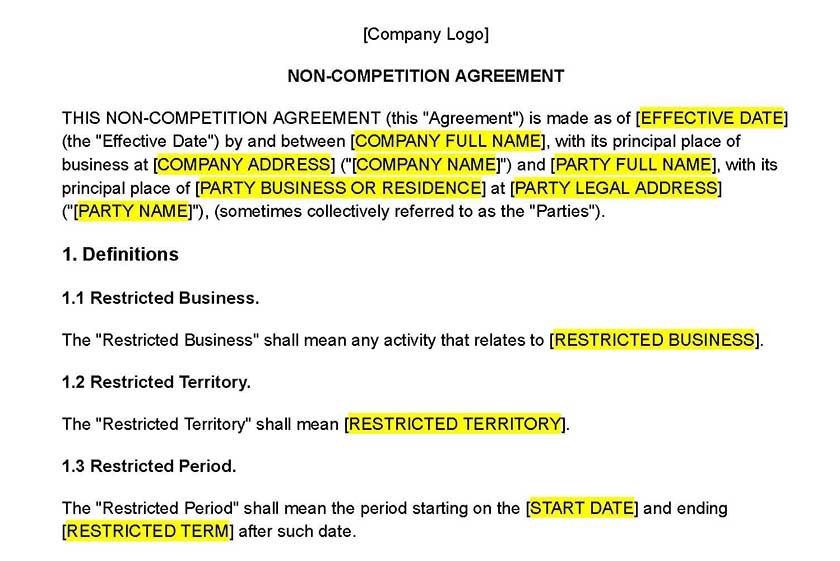Non-compete Agreement: Small Business Guide + Free Template

This article is part of a larger series on Hiring.
Need Help With Hiring Templates?
Get Your Free Hiring Ebook
Send to me

Table of Contents
- 1 What to Include
- 2 When to Use It
- 3 States Laws
- 4 Pros & Cons
- 5 Common Errors to Avoid
- 6 Bottom Line
A non-compete agreement (NCA) safeguards a business’s assets and competitive interests by preventing current employees or other associates, like clients or partners, from seeking similar employment or starting similar businesses and taking customers with them.
The agreement, or contract, is also used by a business when it has a unique or well-performing product, service, or sales platform that could be depreciated with departing employees. Every NCA requires unique, specific, and detailed information about what the company wishes to protect and what the employee is being asked to agree to.
Start with our free non-compete agreement template and customize it to your specific business needs:
FILE TO DOWNLOAD OR INTEGRATE
Non-Competition Agreement Template
Download as PDF
Download as Google Doc
Download as Word Doc

Thank you for downloading!
If you are in need of employment templates, like a non-compete agreement, consider using an all-in-one HR software like Gusto. Get one month free when you run your first payroll. Offer will be applied to your Gusto invoice(s) while all applicable terms and conditions are met or fulfilled.
Select Download Type
What to Include in a Non-compete Agreement
- Restricted Business: Clearly define in your agreement the details and activity that relate to your business that you wish to protect.
- Restricted Territory: Your agreement should define the exact territory that is off limits should an employee leave your organization to seek employment elsewhere.
- Restricted Period: Your agreement should clearly state the timeframe it will be in effect.
- Consideration: Make sure you have a consideration clause in your agreement that supports your employee. A consideration clause spells out the terms and conditions of payment in exchange for mutual consideration.
- Restrictions: A good restrictions guideline lets the employee know they are not allowed to conduct similar business activities outside of your organization.
- Exceptions: Any exceptions to your agreement should be listed.
- Non-solicitation: Include verbiage to expressly forbid any employee from soliciting outside work from any other employee, client, or customer.
- Confidentiality and Non-disclosure: Your agreement should state that no employee is permitted to disclose any confidential information or trade secrets to any source outside of the company.
- Return of Property: If your employees are given company property during their employment (i.e., company computer, company vehicle), provide details on the explicit return of such property upon departure from the company.
- General Provision: This section should state any provision or legal remedies incurred as a result of a breach of contract.
- Acknowledgment: The bottom of your agreement should have a section for the signature and date of both the employee and the company representative.
When to Use a Non-compete Agreement
In general, having a non-compete agreement is becoming more common as competition for customers increases and the entrepreneurial spirit of young employees grows stronger. However, if you are still wondering if an NCA is needed for your business, it is wise to check your state laws or with an attorney (we’ll cover state laws in the section below).
If you answer “yes” to any of the following questions, you should consider having a non-compete agreement signed by all of your employees.
- Do you run a client- or customer-based business?
- Do you worry that your employees will try to open a similar business?
- Do you worry that your employees may be trying to see your clients on the side or telling them they would charge them less?
- Do a lot of your employees have their own businesses on the side?
Different types of companies and positions within a company may need non-compete agreements as well. For example:
- Boutique marketing firm: You may need an NCA in this situation because your team members will most likely have a marketing background and may go to another marketing firm after they work for you. This is what is termed the “right to make a living” in many states that oppose NCAs.
- Fitness studio: You will want to make sure that your staff doesn’t solicit clients to become “private clients” of theirs, such as training them in their home versus in your gym for a cheaper rate.
- Start-up: An NCA is essential to protect yourself as a start-up. This is a scenario where an individual could help you begin your business and then essentially create their own and poach your clients.
- Sales professionals: If your sales professionals are selling a product or service that is widely available on the market, then having an non-compete agreement may help squelch unneeded clientele loss when sales employees leave your company. If your product or service is a niche or patented product, then an NCA is typically not required due to the legal guardrails around the product.
If you determine that you need a non-compete agreement (NCA), it should be part of your onboarding process when you hire employees.
States Laws on Non-compete Agreements
Non-compete agreements often prevent employees from retaining work in the same industry as their former companies. This is why many states have taken matters into their own hands by not allowing NCAs, or, if they do, only under specific or very narrow circumstances.
BREAKING NEWS:
On Jan. 5, 2023, the Federal Trade Commission (FTC) proposed a new rule that would potentially ban non-compete clauses between employers and employees in all 50 states. HOWEVER, a Texas federal judge has ruled AGAINST the FTC regarding non-competes. That means that the non compete ban that was set to begin on September 4, 2024, will NOT be put into action.
Click the drop-down menu to view your state’s law. If your state is not listed, it does not have a current NCA law.

![]()
![]()
